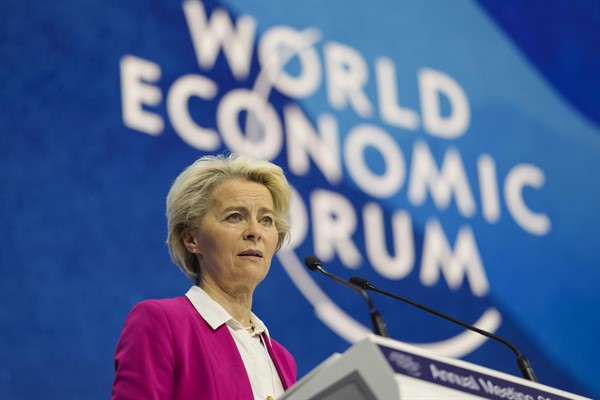European Commission President Ursula von der Leyen told a gathering at the annual World Economic Forum in Davos this week that Russia is deliberately stoking a global food crisis as a form of “blackmail.” Her remarks underscore Brussels’ fears over an impending global food crisis. Recognizing the high stakes involved in global food security, European Union policymakers are now racing against time to prepare for what they anticipate will be a food security crisis unprecedented in the modern era.
Russia’s weaponization of global commodities is not limited to the energy sector, von der Leyen told her audience in Davos. “In Russian-occupied Ukraine, the Kremlin's army is confiscating grain stocks and machinery,” she said. “Ukraine is one of world's most fertile countries. Even its flag symbolizes the most common Ukrainian landscape … Now those fields of grain have been scorched.” Additionally, von der Leyen accused Russia of deliberately bombing grain warehouses across Ukraine and blockading Ukrainian ships in the Black Sea loaded with wheat and sunflower seeds, in its attempt to stoke a global food crisis. “The consequences of these shameful acts are there for everyone to see … global wheat prices are skyrocketing, and it is fragile countries and vulnerable populations that will suffer most,” she added. “Russia is now hoarding its own food exports as a form of blackmail.”
Even as concerns over the ripple effects of Russia’s invasion remain focused on the energy sector, attention has shifted this week to the war’s consequences for the global food system. The Economist warned of a “coming food catastrophe,” and Lithuania called for a naval coalition to break Russia’s Black Sea blockade on Ukrainian grain exports. Meanwhile, Moscow appears to be benefiting from the effects of the crisis it triggered, with Russia exporting its wheat at a higher price to global markets—especially in Africa and the Middle East where wheat prices are skyrocketing due to increased domestic demand. Global wheat prices have already increased by more than 50 percent this year, creating a Russian financial windfall of nearly $2 billion from taxes collected on wheat exports to date, according to estimates from the agricultural consultant SovEcon.

